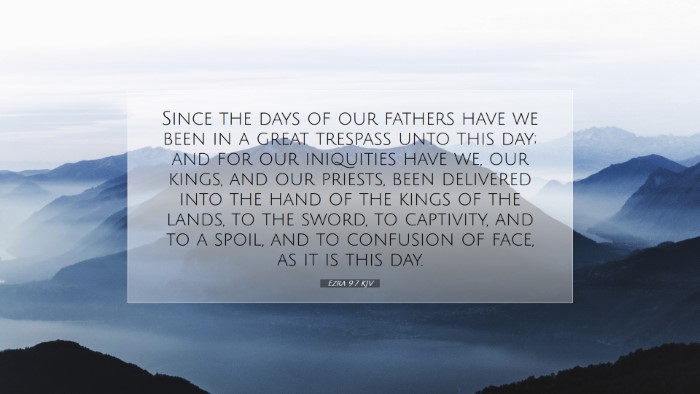Old Testament
Genesis Exodus Leviticus Numbers Deuteronomy Joshua Judges Ruth 1 Samuel 2 Samuel 1 Kings 2 Kings 1 Chronicles 2 Chronicles Ezra Nehemiah Esther Job Psalms Proverbs Ecclesiastes Song of Solomon Isaiah Jeremiah Lamentations Ezekiel Daniel Hosea Joel Amos Obadiah Jonah Micah Nahum Habakkuk Zephaniah Haggai Zechariah MalachiEzra 9:7
Ezra 9:7 KJV
Since the days of our fathers have we been in a great trespass unto this day; and for our iniquities have we, our kings, and our priests, been delivered into the hand of the kings of the lands, to the sword, to captivity, and to a spoil, and to confusion of face, as it is this day.
Ezra 9:7 Bible Commentary
Commentary on Ezra 9:7
Verse Context: Ezra 9:7 states, "Since the days of our fathers we have been in great transgression unto this day; and for our iniquities have we, our kings, and our priests, been delivered into the hand of the kings of the lands, to the sword, to captivity, and to a spoil, and to confusion of face, as it is this day."
Overview of Ezra's Lamentation
In this verse, Ezra articulates a profound confession of the sins of Israel that spans generations. His acknowledgment of transgressions not only highlights the gravity of Israel's disobedience but also serves as a historical reflection on the consequences endured by the nation. Ezra's lament connects the present state of Israel with its past failures, reiterating the unbroken cycle of sin and subsequent judgment.
The Weight of Historical Sins
According to Matthew Henry, this verse reflects the depth of Israel's collective guilt. He emphasizes that Ezra is aware of the long-standing nature of their wrongdoing. The phrase “since the days of our fathers” suggests that the failure to follow God’s commandments is a continuous issue, passed down through generations. It stresses the importance of acknowledging historical sin rather than viewing it as a singular event.
Adam Clarke aligns with this sentiment, indicating that the acknowledgment of iniquity is crucial for repentance. Clarke points out that understanding the history of one's failures can prompt a genuine return to God, inspiring the needed humility and desire for cleansing.
The Consequences of Sin
Ezra’s confession underscores the consequences of Israel's sins, which included political subjugation and spiritual ruin. Albert Barnes explains that the “kings of the lands” refer to the oppressive rulers who controlled Israel due to their iniquities. This captivity serves as a divine punishment fitting for their disregard of God's command, highlighting that sin inevitably leads to conflict and turmoil.
Furthermore, Barnes draws attention to the phrase “to the sword, to captivity, and to a spoil,” suggesting a complete loss of autonomy and dignity. The use of these terms emphasizes how sin can lead to a people’s degradation and suffering, paralleling the New Testament understanding of sin leading to death (Romans 6:23).
Confession and Repentance
The call for confession is prominent in Ezra's declarations. Matthew Henry reiterates the perspective that true repentance begins with the acknowledgment of sin. For Ezra, confessing these long-standing transgressions serves as a necessary step towards reconciliation with God. Henry states, "It is not enough to confess that we have sinned, but we must confess what sins we have committed."
This acknowledgment can lead to a restoration of faith and communal identity among the Israelites. Adam Clarke emphasizes that understanding their past is vital for their restoration; it cultivates a heart of repentance and brings forth a desire for a renewed commitment to God’s covenant.
Implications for Modern Believers
Modern readers, particularly pastors and theologians, can draw significant lessons from this verse. The importance of confession and recognition of historical patterns in one’s spiritual journey can guide contemporary congregations. Albert Barnes suggests that churches today should reflect critically on their own pasts, understanding how previous generations may have strayed from truth and how they can avoid repeating these mistakes.
- Community Confession: Corporate acknowledgment of sin can be a necessary first step toward healing.
- Historical Reflection: Studying the past helps communities assess their spiritual health.
- Consequences of Disobedience: Understanding the harsh results of sin provides a deterrent against future transgressions.
Conclusion
The insights gleaned from Ezra 9:7 reveal profound truths about sin, consequence, and the path to redemption. Ezra’s inspired lamentation should challenge us to consider the nature of our own transgressions, the implications they have on our spiritual communities, and the necessity of turning back to God for restoration.
Overall, both historically and theologically, Ezra 9:7 serves as a timely reminder of the importance of acknowledging our shortcomings and seeking God’s grace, not only for ourselves but also on behalf of our communities and generations that have come before us.


